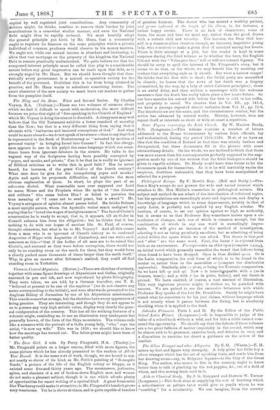The Dear Girl. 3 vols. By Percy Fitzgerald, M.A. (Tinsloy.)—
Mr. Fitzgerald paints on a larger canvas, filled with more figures, the same picture which he has already presented to the readers of All the Year Round. It is the same sort of work, though, we are bound to say, not nearly so clever of its kind, as Mr. Frith's painting of "Ramsgate Sands," a picture of the life of the English colony at Dieppe, as it existed some five-and.thirty years ago. The meannesses, jealousies, spites, and slanders of a set of broken-down English men and women do not make a pleasant subject, though it is one which affords plenty of opportunities for smart writing of a cynical kind. A great humourist like Thaekeray could make it attractive; in Mr. Fitzgerald's hands it grows very wearisome. Yet he is clever at times, and is quite capable of touches of genuine humour. The doctor who has missed a wealthy patient, and grows inflamed at the length of his illness, is, for instance, a
rather happy stroke. There is no lack of characters; some of them, the mean and base we must say, rather than the good, drawn with a certain skill and vivacity. The heroine, the Dear Girl her- self, is a common-place creation enough, an innocent, impulsive young lady, who contrives to make a groat deal of mischief among her lovers. There is little attempt at a plot, but the reader is kept in some suspense during the third volume as to whether the hero, the English Colonel with the " Volasquez face," will or will not commit bigamy. We should bo sorry to spoil the interest of Mr. Fitzgerald's story, but it seems to us that, on the whole, we may benefit him by assuring our readers that everything ends as it should. But what a narrow escape! He thinks that his first wife is dead ; the bridal party are assembled in church ; he learns that the news of her death was a forgery (committed, by the way, by a lady of strict Calvinist principles); there is an awful delay, and then arrives a messenger with the welcome assurance that the death has really taken place a few hours before. So our hero marries his second wife before the first is cold in her coffin, and propriety is saved. Wo observe that in Vol. 111., pp. 141-4, we have a passage repeated almost verbatim from Vol. II., pp. 72-6. The interlocutors are the same, and the circumstances similar, but the action has advanced by several weeks. History, however, does not repeat itself at intervals so short or with so exact a repetition.


































 Previous page
Previous page